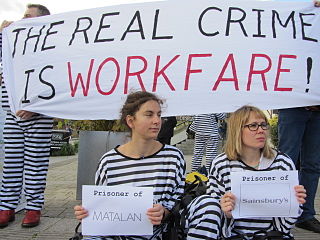Related Research Articles
The New Deal was a workfare programme introduced in the United Kingdom by the first New Labour government in 1998, initially funded by a one-off £5 billion windfall tax on privatised utility companies. The stated purpose was to reduce unemployment by providing training, subsidised employment and voluntary work to the unemployed. Spending on the New Deal was £1.3 billion in 2001.
Jobseeker's Allowance (JSA) is an unemployment benefit paid by the Government of the United Kingdom to people who are unemployed and actively seeking work. It is part of the social security benefits system and is intended to cover living expenses while the claimant is out of work.

Jobcentre Plus is a brand used by the Department for Work and Pensions in the United Kingdom.
Employment and Support Allowance (ESA) is a United Kingdom welfare payment for adults younger than the State Pension age who are having difficulty finding work because of their long-term medical condition or a disability. It is a basic income-replacement benefit paid in lieu of wages. It is currently being phased out and replaced with Universal Credit for claimants on low incomes, although the contribution-based element remains available.
Universal Credit is a United Kingdom social security payment. It is means-tested and is replacing and combining six benefits, for working-age households with a low income: income-related Employment and Support Allowance, income-based Jobseeker's Allowance, and Income Support; Child Tax Credit and Working Tax Credit; and Housing Benefit. An award of UC is made up of different elements, which become payable to the claimant if relevant criteria apply: a standard allowance for singles or couples, child elements and disabled child elements for children in the household, housing cost element, childcare costs element, as well as elements for being a carer or having an illness or disability and therefore having limited capability to work.

R v Secretary of State for Work and Pensions [2013] UKSC 68 is a United Kingdom constitutional law and labour law case that found the conduct of the Department for Work and Pensions "workfare" policy was unlawful. Caitlin Reilly, an unemployed geology graduate, and Jamieson Wilson, an unemployed driver, challenged the Jobcentre policy of making the unemployed work for private companies to get unemployment income. The outcome of the case affects over 3,000 claimants and entails around £130m unpaid benefits.
The Community Action Programme (CAP) also known as Support for the very long-term unemployed is a workfare programme in the United Kingdom whereby long-term unemployed people who have been unemployed for over three years must work for their benefits for six months or have them removed. It was piloted in six areas and then expanded in autumn 2012.
Boycott Workfare is a British campaign group that has opposed "workfare" policies in the United Kingdom. The group's campaigning has been very successful in making companies and charities pull out of "workfare". In January 2014 the group lodged freedom of information requests to investigate the use of workfare by local government. This led to responses from 271 councils, and the results were 62% of them had used unpaid workers during the past two years. This amounted to more than half a million hours of unpaid labour. As of August 2016, more than 50 organisations have ended their involvement in workfare, because of negative publicity.

Workfare in the United Kingdom is a system of welfare regulations put into effect by UK governments at various times. Individuals subject to workfare must undertake work in return for their welfare benefit payments or risk losing them. Workfare policies are politically controversial. Supporters claim that such policies help people move off welfare and into employment whereas critics argue that they are analogous to slavery or indentured servitude and counterproductive in decreasing unemployment.
The Work Programme (WP) was a UK government welfare-to-work programme introduced in Great Britain in June 2011. It was the flagship welfare-to-work scheme of the 2010–2015 UK coalition government. Under the Work Programme the task of getting the long-term unemployed into work was outsourced to a range of public sector, private sector and third sector organisations. The scheme replaced a range of schemes which existed under previous New Labour governments including Employment Zones, New Deal, Flexible New Deal and the now abolished Future Jobs Fund scheme which aimed to tackle youth unemployment. Despite being the flagship welfare-to-work scheme of the Conservative-led coalition government, and then the incumbent Conservative government from May 2015, the DWP announced, in November 2015, that it was replacing the Work Programme and Work Choice with a new Work and Health Programme for the longer-term unemployed and those with health conditions. The DWP also announced that it would not be renewing Mandatory Work Activity and Help to Work which included Community Work Placements.
Personal Independence Payment is a welfare benefit in the United Kingdom that is intended to help working age adults with the extra costs of living with a health condition or a disability. It is available in England, Wales and Northern Ireland but not in Scotland where Adult Disabled Payment (ADP) is claimed instead where it also replaces DLA in Scotland also

The Welfare Reform Act 2012 is an Act of Parliament in the United Kingdom which makes changes to the rules concerning a number of benefits offered within the British social security system. It was enacted by the Parliament of the United Kingdom on 8 March 2012.
Universal Jobmatch was a British website for finding job vacancies. The site was developed in a collaboration between the Department for Work and Pensions and Monster.

The Jobseekers Act 2013 is an emergency Act of Parliament of the United Kingdom introduced to the House of Commons in March 2013. It retrospectively changed the law to make past actions of the government which the courts had found unlawful to be lawful. As of July 2014, the Act has been found to contravene Article 6 of the European Convention on Human Rights.
Department for Work and Pensions v Information Commissioner was a 2013 first-tier tribunal case in the United Kingdom. It concerned a dispute over whether companies that had participated in government 'workfare' schemes should be released under the Freedom of Information Act following a request by a man called Frank Zola. The tribunal ruled that the names of participant companies should be released.
Help to Work was a government workfare scheme in the United Kingdom for individuals who had not found work after two years on the Work Programme. Help to Work was the overall name for Community Work Placements and other intensified "activation" measures, and was launched at the start of 2014, but it was announced in November 2015, that the DWP was "not renewing" it. Referrals to Community Work Placements ended in March 2016, with contracts ending by October. All other referrals ended in March 2017.
Community Work Placements were a UK Government workfare scheme under which unemployed claimants had to work for up to 26 weeks/30 hours in order to continue to receive Jobseekers Allowance The policy has been criticized by a number of organizations. Community Work Placements (CWPs) were launched at the start of 2014, but it was announced in November 2015, that the DWP was "not renewing" them.
The Day One Support for Young People Trailblazer was a compulsory workfare scheme for young unemployed 18- to 24-year-olds, that was trialled in North and South London Jobcentre Plus districts, between 26 November 2012 and 26 July 2013. The workfare scheme whereby unemployed people must work in return for state unemployment benefits was introduced during a time of particularly high youth unemployed in the United Kingdom. As a mandatory scheme, claimants were sanctioned if they failed to meet the requirements of the scheme. The scheme differed from other workfare schemes which are generally aimed at the long term unemployed as claimants were forced onto the scheme immediately or soon after making a claim for Jobseeker's Allowance if they "had not previously completed six months of paid employment since leaving full time education". Claimants were mandated to complete 30 hours of work for 13 weeks and also had to continue to "sign on" during that period.

Iain Duncan Smith served as Secretary of State for Work and Pensions from 2010 to 2016. A member and previous leader of the Conservative Party, Duncan Smith was appointed to the cabinet by Prime Minister David Cameron following the 2010 general election and the formation of the coalition government between the Conservatives and the Liberal Democrats. He was reappointed after the Conservatives won a majority in the 2015 general election but resigned in March 2016 in opposition to disability benefit cuts.
References
- ↑ "Department for Work and Pensions' settlement at the Spending Review". DWP. 2015-11-25. Retrieved 2015-11-27.
- ↑ "Qualitative evaluation of the Jobseeker Mandatory Activity (JMA) (PDF 236.97 KB)". Sheffield Hallam University. 2008-07-31. Retrieved 2015-12-30.
- 1 2 Simon Parker (28 March 2013). "Workfare and the State of Exception". openDemocracyUK. Retrieved 17 January 2016.
- ↑ "Jobseekers (Back to Work Schemes) Bill: Explanatory Notes". UK Parliament. 19 March 2013. Retrieved 17 January 2016.
- ↑ "Jobseekers (Back to Work Schemes) Act 2013". ww.legislation.gov.uk. Retrieved 17 January 2016.
- ↑ "The Rule of Law Undermined". Law Student Leaks. 19 Mar 2013. Retrieved 17 January 2016.
- ↑ Shiv Malik (15 March 2013). "DWP Seeks Law Change to Avoid Benefit Repayments after Poundland Ruling". The Guardian. Retrieved 17 January 2016.
- ↑ Suzuki, Moet; Malik, Shiv (12 February 2013). "Poundland ruling 'blows big hole' through government work schemes". The Guardian. London.
- ↑ Hugh Muir; Shiv Malik (21 March 2013). "Labour Abstention on Workfare Bill Prompts Party Infighting" . Retrieved 17 January 2016.
- ↑ Shiv Malik (19 May 2013). "Workfare placements must be made public, tribunal rules". The Guardian. Retrieved 17 January 2016.
- ↑ Boycott Workfare campaign